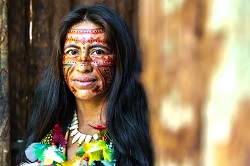What knowledge societies can learn from foraging societies
It is often said that we live in a ‘knowledge society’, where the generation, storage, exchange and application of information, ever increases human capital. At the same time research in industrialised nations has also shown that unequal access to these systems of knowledge (often due to educational barriers), results in increased benefit only for the few. However this research, ‘did not consider the importance that sharing and cooperation might have in understanding the adaptive nature of knowledge,’ according to Professor Reyes-García of the Institute of Environmental Science and Technology, Universitat Autònoma de Barcelona (ICTA-UAB). Indeed, professor based at the Catalan Institution for Research and Advanced Studies (ICREA) points out that overall there is a dearth of empirical, comparative research on the influence of how culture might actually shape knowledge. In an age where many problems such as climate change require cooperative efforts, understanding this adaptive knowledge process could prove crucial. Along with her team, Professor Reyes-García set about studying Local Environmental Knowledge (LEK) amongst indigenous peoples. The LEK project looked specifically at the implications of LEK for the ‘knowledge society’ and secondly, how biodiversity policies in tropical forests affect the livelihood of indigenous peoples. A ground-breaking study of Local Environmental Knowledge While previous LEK studies had typically been conducted in one setting, thus limiting generalisations, this project analysed the dynamic functioning of LEK across three foraging societies: the Tsimane' (forager-horticulturalists from Bolivian Amazonia), the Baka (semi-nomads from the Congo Basin), and the Punan Tubu (hunter-gatherers from Borneo). These societies were chosen due to their relative independence from formal economic, education and health systems. Researchers lived for a year and a half with the communities using a range of qualitative (e.g. interviews) and quantitative (e.g. GPS tracks) tools of data collection. To ensure robust results, the study used an investigative method which was both culturally-specific but also cross-culturally comparative, to analyse LEK related to wild edibles, medicinal plants, agriculture, and hunting. Multivariate analysis, amongst others, was used to attain estimates of knowledge returns on (i) health, (ii) nutritional status and (iii) farming and foraging productivity. The data then allowed for generalisations on both LEK returns and the conditions under which it is adaptive or not. For these small-scale societies, the study shows that LEK contributed to improved health and nutrition, biodiversity management and sustainable agricultural practices. This has important implications for conservation practices. For example, one of the results is that those with higher LEK were more likely to observe the impact of climate change on local systems, findings helpful to scientists looking at effective means of adaptation. As Prof Reyes-García points out, by ignoring LEK, ‘we condemn societies to reinvent a complex wheel of adaptive responses to change.’ From a policy stand-point, in an effort to avoid destructive practices such as logging, often conservation efforts focus on preventing all human access to nature, including for subsistence use. However, being dependent on tropical forest resources (for food, medicine, shelter etc.), while using the forests in sustainable ways, may actually make indigenous peoples their most qualified custodians. Therefore, the study recommends ‘bio-cultural’ approaches which integrate the culture and challenges of indigenous societies and promote inter-generational knowledge transfer. Sharing knowledge benefits as a possible community adaptation strategy. Perhaps the most far reaching research finding, was that while knowledge itself was not evenly spread within the societies, the benefits of that knowledge were. For example, those with higher overall LEK did not necessarily also have commensurately higher nutrition status than the rest of the society. Whilst this may at first appear to be paradoxical, the research concluded it was due to the sharing, cooperative and reciprocal nature of these societies. As Prof Reyes-García contends, ‘the results provide us not only with a better understanding of previously neglected knowledge systems, but also with alternative mechanisms to guide the production and use of knowledge.’ She goes on to elaborate that with European science investing in programmes such as ‘Science with and for Society’, her team’s results, ‘call for policy makers to strengthen mechanisms that promote and facilitate the open sharing of information and dissemination of scientific findings in society; to maximize their social benefits and to develop pathways that ease the transfer of both local and scientific knowledge to decision-makers at any level.’ Professor Reyes-García posits, that whilst beyond the scope of her current data-set the hypothesis that higher overall collective knowledge (even at the expense of the individual) might constitute an adaptive strategy for communities, is one that merits further investigation. For more information please see: project website
Countries
Spain



